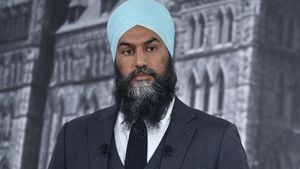UK Artists Unite Against AI Copyright Proposals
Prominent figures in the creative industries warn of devastating consequences for artists and the economy.
Iconic actors, musicians, and writers across the UK have banded together to oppose proposed revisions to copyright legislation concerning artificial intelligence (AI). This coalition, which includes well-known names like Sir Stephen Fry, Dua Lipa, Sir Michael Morpurgo, and Ed Sheeran, has issued strong warnings about the potential damage these changes could inflict on creative sectors.
According to a joint letter published by The Times, the proposed amendments to UK copyright law are seen as unnecessary and highly detrimental. These adjustments would allow AI models to train more freely on copyrighted materials, putting the livelihoods of creative professionals at risk. The artists contend, "The proposal is wholly unnecessary and counterproductive, jeopardising not only the country’s international position as a beacon of creativity but also the resulting jobs, economic contribution and soft power — and especially harming new and young artists who represent our nation’s future."
The proposed law would create exemptions for tech firms, meaning they could use copyrighted material to develop AI models without needing permission, forcing creators to actively opt out if they wish to protect their work. Given the creative industries contribute £216 billion annually to the UK economy and employ around 2.4 million people, the letter's signatories argued against any legislative action they believe could erode these sectors.
The letter concludes emphatically, stating, "There is no moral or economic argument for stealing our copyright. Taking it away will devastate the industry and steal the future of the next generation."
Composer Andrew Lloyd-Webber, along with his son Alastair, voiced similar concerns in The Guardian. They maintained, "Copyright underpins the creative economy, ensuring creators retain control and are fairly compensated." Their commentary highlights how AI's ability to mimic patterns does not equate to genuine creativity, sounding alarms over what they term as “an economic failure in the making.”
They went on to explain, "AI will flood the market with machine-generated imitations, undercutting human creativity and destroying industries driving jobs, tourism, and Britain’s cultural identity." To strengthen their case, the pair shed light on the challenges facing songwriters, who earn only 15% of streaming revenue, compared to record labels and artists receiving traditional shares.
Amplifying these voices, over 1,000 musicians—including Kate Bush, Annie Lennox, and Damon Albarn—have collaborated on what has been dubbed "a silent album" as protest against the proposed changes. The album features contributions from musicians of varied backgrounds, including Billy Ocean and The Clash. Its track listing clearly states, "The British government must not legalise music theft to benefit AI companies," with all profits directed to the charity Help Musicians.
The outcry is not limited to musical artists; journalists and publishers are equally alarmed. The News Media Association (NMA) and the Society of Editors (SOE) have rallied against the proposals through the Make It Fair campaign. Newspapers featured eye-catching cover wraps condemning the government’s approach, stating, "The Government wants to change the UK’s laws to favour big tech platforms so they can use British creative content to power their AI models without our permission or payment. Let’s protect the creative industries – it’s only fair."
Significantly, these protests advocate for creators' rights and assert the need for government intervention to reaffirm and fortify existing copyright protections. Many stakeholders believe failing to do so could place the UK’s creative industry on shaky ground.
Lloyd-Webber and his son outlined specific amendments proposed by Beeban Kidron, which include safeguards ensuring AI firms seek creator permission and financially compensate them for their work. They caution against the government's assertion this legislation will attract AI investment, arguing instead it risks endangering the very fabric of the UK's creative community.
Reflecting on the historical significance of copyright law, they pointed out the origins of British copyright legislation trace back to 1710 with the Statute of Anne, setting global standards for creator rights. They lamented, "It is extraordinary, more than 300 years later, this government is planning to dismantle those protections. Creative artists are working people, and their work is of untold value economically, socially, and culturally."
Both artists and advocates agree: if the current proposals take effect, the results will reverberate throughout the industry, devaluing original creative works and replacing them with machine-generated replicas. The future of creativity itself could hang in the balance, prompting artists to question whether the next cultural icon will emerge organically or be artificially constructed—Do we want our children to discover the next David Bowie, or David BowAI?
There is no doubt these discussions will continue as the UK grapples with balancing innovation and the protection of its cultural legacy, underscoring the urgency for dialogue surrounding the future of creativity and copyright law.



